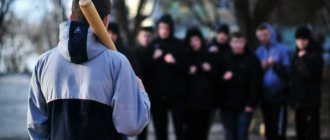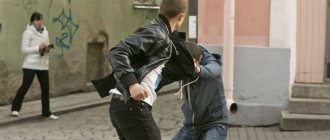Criminal Code of the Russian Federation in the latest edition:
Article 118 of the Criminal Code of the Russian Federation. Causing grievous bodily harm through negligence
1. Causing grievous bodily harm through negligence -
shall be punishable by a fine in the amount of up to eighty thousand rubles, or in the amount of the wages or other income of the convicted person for a period of up to six months, or by compulsory labor for a term of up to four hundred eighty hours, or by corrective labor for a term of up to two years, or by restriction of liberty for a term of up to three years. , or arrest for up to six months.
2. The same act, committed as a result of improper performance by a person of his professional duties, -
is punishable by restriction of freedom for a term of up to four years, or forced labor for a term of up to one year with deprivation of the right to occupy certain positions or engage in certain activities for a term of up to three years or without it, or imprisonment for a term of up to one year with deprivation of the right to occupy certain positions or engage in certain activities for a period of up to three years or without it.
3. Lost power. — Federal Law of December 8, 2003 N 162-FZ.
4. Lost power. — Federal Law of December 8, 2003 N 162-FZ.
Return to the table of contents of the document: Criminal Code of the Russian Federation in the latest edition
What is serious harm to health
Decree of the Government of Russia dated August 17, 2007 No. 522 approves the Rules for determining the severity of harm to human health. According to Article 4 of the Resolution, damage to health will be considered grave under the following circumstances:
- harm dangerous to the life of the victim;
- complete dysfunction of any organ without the possibility of restoring functionality;
- complete loss of hearing, speech or vision;
- termination of pregnancy as a result of the actions of the offender;
- as a result of the harm, a mental disorder has arisen that requires the participation of a specialist (even if a full recovery is possible);
- due to the damage received, drug addiction or substance abuse has arisen;
- permanent facial disfigurement;
- persistent (i.e. long-term) loss of ability to work by more than 1/3;
- complete loss of professional ability to work, that is, a person cannot continue working in his specialty.
Additionally, these signs are indicated in Article 111 of the Criminal Code of Russia. And this is the complete list. If the results of the examination confirm mild or moderate harm to health, then the punishment under Article 118 will not be applied. Instead, other, related articles will be used (more on that below).
In detail: Which articles of the Criminal Code of the Russian Federation establish liability for causing grievous bodily harm?
What damage is considered unintentional?
According to criminal theory, in order to hold a person legally liable, it is necessary to prove the presence of four mandatory elements. This:
- The subject is the person who committed the crime. Each norm of the Criminal Code has its own requirements for guilty citizens, which are limited by age. Additionally, it is stated that only physically sane persons can be brought to justice.
- An object is a group of social relations that are affected by a violation. These could be property rights, human life and health, and social safety.
- The objective side is a set of actions/inactions that led to negative consequences.
- The subjective side is a person’s attitude towards his crime. So-called intent, which can be direct and indirect. Moreover, one can be brought to justice if a crime is committed unintentionally (frivolously, carelessly).
Harm to humans is usually understood as harm to the human body and organism through mechanical action. Such illegal acts will be recognized as unintentional if the offender did not want illegal consequences to occur, but understood that such could occur (he frivolously hoped that everything would work out).
Liability for unintentional injury to health will be assigned based on the severity of the consequences for the person. Establishing the severity of harm is the responsibility of a forensic medical expert. In total, there are three degrees of physical harm to a person. These include:
- Minor harm - minor damage, which is accompanied by minor visible signs (bruises, scratches, abrasions), as well as pain. Such damage does not entail loss of legal capacity and does not require hospital treatment. Injuries are characterized by complete resolution of symptoms within one week.
- Damage of moderate severity will be recognized if the injuries caused require hospital treatment, but guarantee the person’s full recovery. It is also necessary to confirm that at the time the wound was inflicted there was no threat to human life. This category will include dislocations, fractures, and concussions.
- Complete dysfunction of individual organs and systems, the presence of irreversible disorders, as well as causing harm that poses a threat to human life will be regarded as grave harm.
Article 118 of the Criminal Code of Russia
Article 118 of the Criminal Code of the Russian Federation provides for punishment if the following signs are present:
- The harm caused is classified as grave.
- The actions were committed due to negligence.
- The cause-and-effect relationship between the consequences and the actions of the perpetrator has been confirmed.
It is possible to bring to criminal liability if the actions of the accused have all the signs of a crime, called its corpus delicti. These features include subject, object, objective side and subjective side. They are discussed below.
Who can be held accountable – the subject
For unintentional infliction of grievous bodily harm under Article 118 of the Criminal Code of the Russian Federation, punishment will be applied only to individuals who have reached the age of 16 years.
It is also necessary to confirm the sanity of the offender. For this purpose, a request is sent to the city clinic to a psychiatrist and narcologist. If a person is under preventive care with a mental disorder, alcohol or drug addiction, or there is a suspicion regarding the sanity of the guilty person, the investigator/interrogator additionally prescribes a psychiatric examination.
Part 2 of Article 118 separately provides for liability for persons performing professional activities (forklift driver, electrician, nurse, etc.). If, as a result of the performance of work functions, serious harm to health was caused to third participants, this part of the article applies.
What legal relations does the crime encroach on?
The violation encroaches on public relations in the sphere of protecting human life and health. This means that as a result of unintentional actions, harm is caused to a specific person (his health and life). For liability under Art. 118 of the Criminal Code of the Russian Federation - this is serious harm to health.
The attitude of the criminal to the violation is the subjective side
Liability will be assigned only for the careless infliction of grievous harm to the health of the victim. The law provides for two forms of negligence:
- Frivolity.
- Negligence.
frivolity
The guilty person foresaw or could have foreseen the infliction of serious harm to the health of the victim, but counted on their avoidance.
Example: In the midst of a personal conflict, citizen A began beating citizen B in the head area. The offender in such circumstances could and should have foreseen the consequences, but hoped that the harm would be light.
Negligence
The citizen does not want to cause serious harm to a person and did not foresee its occurrence. But in the current circumstances, with the necessary care, he should have foreseen that his actions would entail such consequences.
Example: At the beginning of spring, citizen K. decided to poison moles in his garden. For this purpose, he purchased poison, which he divided into portions on the kitchen table. As a result of carelessness, some of the poison granules spilled onto the table. Citizen K.’s sister laid fruit on the table and some of the poison got on the food. As a result, the woman suffered partial brain damage and, as a consequence, loss of professional ability to work.
What actions will be punished - the objective side
Careless infliction of serious harm to health may be accompanied not only by active influence on the part of the offender, but also by inaction at the moment when it was necessary to provide assistance or timely prevent further development of the disorder.
The following will be considered active actions:
- battery;
- pushing;
- causing harm using improvised objects;
- mechanical damage caused by exposure to fire, chemicals, extreme temperatures;
- poisoning.
As for inaction, the following situation can serve as an example: Citizen B., during a quarrel, pushed Citizen K., who fell and hit his head on the concrete floor. Citizen K. suffered a fractured skull and also lost consciousness. Citizen B. left the scene of the crime.
Later, the examination prepared a conclusion in which it was stated that as a result of large blood loss, irreversible consequences occurred for the brain, which led to the development of mental disorders. The consequences could have been avoided if citizen B. had immediately stopped the bleeding or called an ambulance.
Corpus delicti
- The object of such an offense is the health of a person, in this case the victim.
- The objective side is the commission of certain actions (or, conversely, inaction) that led to grave harm.
- The subject against whom the case may be considered may be a person recognized as sane. Moreover, at the time of committing the crime he must be at least 16 years old.
- The subjective side in crimes under Art. 118 is negligence. It can be expressed both in negligence and in frivolity. In all cases, actions are observed that are theoretically dangerous; at the same time, the offender does not realize this or unreasonably believes that nothing will happen.
Qualifying signs and punishment
Article 118 consists of two parts.
The first - the general rule provides for liability for causing grievous harm through negligence. Types of punishment that can be applied to a violator:
- A fine of up to 80 thousand rubles or penalties in an amount not exceeding the criminal’s six-month official income.
- No more than 480 hours of compulsory work.
- Up to 24 months of correctional labor.
- Up to six months of arrest.
- Restriction of freedom for a period of up to three years.
The second part of the article provides for a more severe punishment, taking into account the qualifying circumstances, that is, the special conditions for committing the crime. Bring to justice under Part 2 of Art. 118 of the Criminal Code of Russia can only be applied to a person who improperly performed his official duties. As a result, the victims received injuries assessed by a forensic expert as serious.
The Criminal Code provides for the following types of punishment:
- No more than 4 years of restriction of freedom.
- Up to 12 months of forced labor.
- Imprisonment, but not more than one year.
For the second part, additional punishment may also be applied. Along with forced labor and imprisonment, in this case a decision may be made to ban the implementation of a specific type of activity (for example, medical practice) for a period of up to 3 years.
Release from liability
A person may be released from liability for innocent causing of harm, as provided for in Art. 28 of the Criminal Code. Innocent causing is recognized in the following cases:
- the person did not foresee the possibility of consequences and, in the current circumstances, could not foresee them;
- the person foresaw the onset of illegal consequences, but could not stop and prevent them due to the discrepancy between the psychological or physical state of the extreme situation.
Statistics
There are no exact statistics on such cases, although official websites have figures for individual years. Moreover, they do not even appear in a separate column - they are simply mentioned under the table. If we take general indicators, then for every 1 million crimes of various nature there are 2-3.5 thousand cases where death was caused by negligence .
Fatal accidents , where responsibility for what happened lies with the driver, deserve special consideration. These offenses may also fall under the law on causing death by negligence, that is, under Article 109 of the Criminal Code.
In some years, the number of deaths reaches 70%, if calculated as a percentage. In general, their indicator “stays” at a high level.
Difference from related articles
After receiving a report of a crime (the victim, his legal representative or third parties who become aware of the commission of an offense can file a complaint), law enforcement officials determine on the basis of which article of the Criminal Code the punishment will be applied.
Art. 118 of the Criminal Code of the Russian Federation is a general rule. If there are special rules in the Criminal Code, other articles of the Criminal Code are applied, which we have collected below. The degree of responsibility of the violator depends on the chosen article.
Art. 109
If a person’s actions/inaction resulted in death, although there was no intent even to cause grievous harm, then liability will be assigned under this article – “causing death by negligence.”
Art. 111
According to this norm, punishment is imposed in the case of intentional infliction of serious harm to human health. In the case where the guilty person wanted to cause grievous harm, but unintentional death occurred, the punishment will be applied under the article “intentional infliction of grievous harm to health” (Part 4 of Article 111 of the Criminal Code of the Russian Federation).
Details: Article 111 of the Criminal Code of the Russian Federation
Art. 113
A state of affect is a state of temporary psychological instability caused by strong emotions (stress, fear, jealousy). If serious health consequences were caused under the influence of passion, then Article 113 will be applied. Passion is proven by ordering a psychiatric examination if there are factors indicating possible emotional distress of the guilty person.
Art. 114
Necessary defense, as well as the implementation of measures aimed at apprehending a criminal, free a person from responsibility. But if the necessary measures were exceeded, as a result of which serious consequences occurred in the form of grievous bodily harm, then punishment will have to be incurred.
Art. 216
For violation of safety rules during construction work, if the violation resulted in serious harm to health, punishment is imposed. Although this is considered serious harm to health due to negligence. Subject under Art. 216 of the Criminal Code of the Russian Federation - a special person, that is, a person involved in construction work and is obliged to comply with safety precautions.
Art. 219
Violation of fire safety requirements results in administrative liability, but if a cause-and-effect relationship between the violations and the resulting serious harm to human health is proven, then criminal liability cannot be avoided. Punishment applies to persons who ignore fire safety precautions.
Art. 264
Road traffic accidents are the most common mechanism for causing serious injuries. But if the harm is caused due to violation of the rules of operation of vehicles or traffic rules, then another article will be used - 264 of the Criminal Code of Russia. In this case, the violation of traffic rules was committed intentionally, and serious consequences were caused by negligence.
Classification of crimes under Art. 118 of the Criminal Code of the Russian Federation
Significant damage to health is caused, and the crime is qualified under Article 118, when as a result of the incident:
- the victim loses an organ or has lost the ability to function (vision, hearing, speech);
- a severe mental disorder occurs;
- pregnancy is terminated artificially or naturally (at any stage);
- the face becomes disfigured and cannot be restored;
- drug addiction occurs;
- loss of ability to work (completely or by one third);
- the citizen is dying.
Statistics
Unfortunately, there are no reliable official statistics on this type of crime. And all because serious harm to health due to negligence is a rather hidden crime. And a considerable number of citizens simply do not turn to law enforcement agencies to hold the perpetrators accountable.
Or it happens that the harm caused to the victim is not regarded as grave or moderate , and therefore such cases are written off as administrative or civil.
Arbitrage practice
On August 10, 2022, a magistrate judge in the city of Moscow considered a case involving the infliction of grievous harm by negligence.
During the dispute, citizen V. struck one blow to citizen B. in the eyebrow area (minor injuries, since only an abrasion remained). From the impact, citizen B. fell onto the asphalt, resulting in an open craniocerebral injury, which was assessed by the expert as grievous harm. The result is that citizen V. is found guilty and sentenced to 100 hours of compulsory labor.
Mitigating and aggravating circumstances
After establishing the circumstances of the case, the investigator transfers the finished materials to the prosecutor, who prepares the paperwork for submission to the court. In his covering letter, the prosecutor indicates the desired punishment, but only within the framework of the criminal article. Next, the court decides whether the chosen preventive measure is appropriate and can change the punishment at its discretion.
The severity of the sanction will be influenced by accompanying aggravating or mitigating circumstances . Mitigating circumstances will include the following:
- voluntary compensation for harm caused;
- age of the offender (the court is more loyal to minors);
- commission of an offense due to independent circumstances;
- pregnancy of the criminal;
- the offender has young children, that is, those who have not reached the age of 14;
- provision of medical care;
- service addiction.
The worsening of the punishment will be influenced by aggravating circumstances, which are determined individually for each situation . As a general rule, this category of characteristics will include the following:
- committing an offense while under the influence of alcohol/drugs/psychotropic intoxication;
- causing harm by a group of persons by prior conspiracy;
- causing harm for hooligan reasons;
- the victim is singled out due to any kind of discrimination;
- causing particularly grave consequences;
- the victim is a pensioner, a minor, a pregnant woman, that is, a person who could not protect himself from an unlawful attack;
- committed by an official in the performance of official duties.
The analysis of mitigating and aggravating circumstances is the responsibility of the chief judge. But during the pre-trial investigation, the inquiry officer/investigator is obliged to verify such facts and indicate them in the charge.
Civil responsibility
In addition to the penalties provided for by criminal law, the injured party has the right to bring a civil claim against the offender aimed at repaying the damage caused. Thus, you can claim compensation for the following types of damage:
- moral;
- material (must be supported by financial documents).
A civil claim is brought to court at the first hearing so that the judge has the opportunity to assess the damage caused and award or cancel compensation.
Prosecution for unintentional harm occurs because, despite the lack of desire to cause unlawful consequences, a person could realize that he was committing a crime and could stop it in advance. It does not matter whether the violator’s actions are careless or frivolous.










